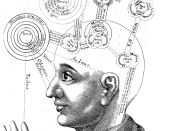Idealism is the philosophical system developed by an Irish philosopher George Berkeley (1685-1783). Being an Idealist means that he believes that physical objects - like matter - do not exist independent of the mind. According to Berkley, the pencil that I am writing this essay with would not exist if I did not perceive it with my senses. Berkeley attempts to show that things can and do exist apart from the human mind and our perception. In Berkley's dialogue between Hylus and Philonous, they state that either there is a mind in which all ideas are perceived, or a god that creates perception in the human mind. In other words, according to Berkley, god is the ultimate creator of our perceptions. Because of this belief, he ultimately rejects such philosophies as Lucretius', where Lucretius tries to deny the very existence of a God. Therefore Berkley says that the external world can not be understood by thought, but "sensible things".
These are objects that we perceive that are reduced to ideas in the mind. These ideas, or "objects before the mind", possess primary qualities, secondary qualities, the main structure, and what we derive from our senses (which are inseparable). This is confusing, because if I'm thinking about a star in a different galaxy, (which makes the star an "object" before my mind).
To me it is quite strange believing that god created this planet in 7 odd days, but it is even odder trying to believe that he controls our experiences. Please do not take me wrong, I am religious and I do believe in god but I do not agree with some parts of the bible. With all my respect to Berkley, god is not the answer to everything, just as Lucretius states. He claims that religion is...


